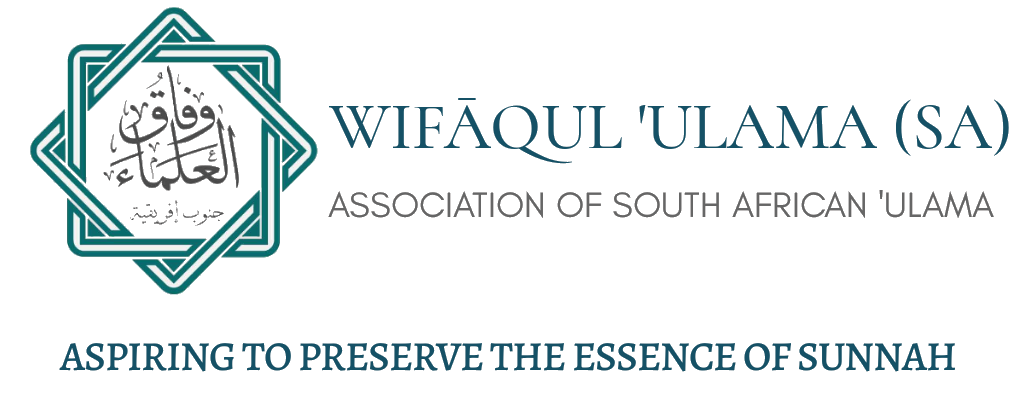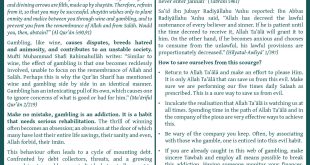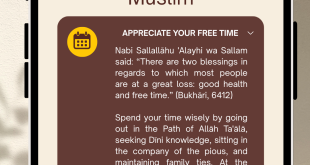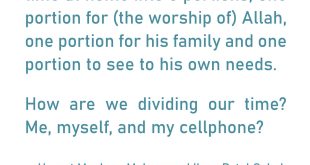
Fulfilling the Trust We Owe to Allah Ta‘ala and the Creation
During the pre-Islamic era and after the advent of Islam, Uthmaan bin Talhah was the custodian of the keys of the Ka’bah. He would open the Ka’bah on Mondays and Thursdays, allowing people to enter and engage in ibaadah.
On one occasion, prior to the hijrah, while people were entering the Ka’bah Shareef on the day allocated for entering, Rasulullah (sallallahu ‘alaihi wasallam) also intended to enter. However, Uthmaan bin Talhah did not allow him entry and spoke rudely and harshly to him.
Rasulullah (sallallahu ‘alaihi wasallam) patiently endured his harsh treatment and addressed him saying, “O Uthmaan! A day is soon to come when you will see the keys of the Ka’bah in my hand, and I will have the power to give it to whomsoever I wish.” Uthmaan responded saying, “That day will be a day of disgrace for the Quraish.” Rasulullah (sallallahu ‘alaihi wasallam) said, “No! Rather, it will be a day of great honor for the Quraish.”Uthmaan bin Talhah says, “I knew that this day will certainly come and I had full conviction that what Rasulullah (sallallahu ‘alaihi wasallam) said was bound to take place.
Nevertheless, the time came when Allah Ta‘ala commanded Rasulullah (sallallahu ‘alaihi wasallam) and the Sahaabah (radhiyallahu ‘anhum) to perform hijrah to Madinah Munawwarah, and many fierce battles ensued between the Muslims and the Quraish in the years that followed.
Then came the time when Allah Ta‘ala inspired the heart of Uthmaan bin Talhah to embrace Islam. Hence, he set out from Makkah Mukarramah to Madinah Munawwarah in the 7th year after Hijrah to declare his imaan and pledge allegiance at the blessed hands of Rasulullah (sallallahu ‘alaihi wasallam).
One year later, on the occasion of Fath-e-Makkah (the conquest of Makkah), Rasulullah (sallallahu ‘alaihi wasallam) instructed Hazrat Uthmaan bin Talhah (radhiyallahu ‘anhu) to bring the keys of the Ka’bah to him, since the keys were in the care of his family.
After bringing the keys, Rasulullah (sallallahu ‘alaihi wasallam) entered the Ka’bah and engaged in ibaadah. Thereafter, when Rasulullah (sallallahu ‘alaihi wasallam) came out from the Ka’bah, Hazrat Abbaas and Hazrat Ali (radhiyallahu ‘anhuma) both desired to be granted the honor of being the custodians of the keys of the Ka’bah.
While Rasulullah (sallallahu ‘alaihi wasallam) was in the Ka’bah, Allah Ta‘ala had revealed the following verse of the Qur’aan Majeed, instructing him to return the trust to Hazrat Uthmaan bin Talhah (radhiyallahu ‘anhu) and his family. (Durr-e-Manthoor 2/570) Allah Ta‘ala said:
اِنَّ اللّٰهَ یَاۡمُرُکُمۡ اَنۡ تُؤَدُّوا الۡاَمٰنٰتِ اِلٰۤی اَهْلِهَا
Indeed Allah Ta‘ala commands you to return the trust to those who are entitled to it. (Surah Nisaa v. 58)
Rasulullah (sallallahu ‘alaihi wasallam) then returned the keys to Hazrat Uthmaan bin Talhah (radhiyallahu ‘anhu), and told him that the keys will remain with his family, and that no one will take it from them besides an oppressor. (Majm’uz Zawaa’id #5707)
When Hazrat Uthmaan bin Talhah (radhiyallahu ‘anhu) was leaving with the keys, Rasulullah (sallallahu ‘alaihi wasallam) called him back and said, “O Uthmaan! Do you remember what I had told you in the past, that a day is soon to come when you will see the keys of the Ka’bah in my hand, and I will have the power to give it to whomsoever I wish?” Hazrat Uthmaan bin Talhah (radhiyallahu ‘anhu) replied, “Yes, O Nabi of Allah (sallallahu ‘alaihi wasallam)! I remember that day.” (Taareekh Dimashq 38/377-378, Ibnu Sa’d 5/17)
From the abovementioned verse of the Qur’aan Majeed, we learn that all trusts should be returned to those who are entitled to them. In the Mubaarak Ahaadith, Rasulullah (sallallahu ‘alaihi wasallam) has placed great emphasis on fulfilling trusts.
It should be understood that fulfilling trusts is not confined to wealth which has been entrusted to a person, but rather includes every type of responsibility (whether worldly or deeni) which one has been given. The imaam of the musjid, the mu’azzin, the mutawalli, the ruler or subject, the teacher or student, the employer or employee, the purchaser or seller, the husband or the wife, the parents or children, the neighbors or associates – all have been entrusted with a responsibility which they owe to Allah Ta‘ala and to the creation. Hence, the greatest trust, which will include all trusts, is the trust of deen.
On the Day of Qiyaamah, we will be questioned regarding the fulfillment of all these trusts.
May Allah Ta‘ala bless us with the tawfeeq of fulfilling this trust correctly, in accordance to the laws of Shari‘ah.
 Wifāq ul Ulāma (SA) ASSOCIATION OF SOUTH AFRICAN 'ULAMA
Wifāq ul Ulāma (SA) ASSOCIATION OF SOUTH AFRICAN 'ULAMA


